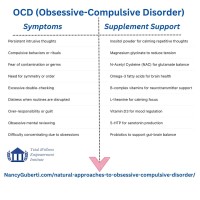
Obsessive-Compulsive Disorder (OCD) is a chronic mental health condition that affects millions worldwide. Characterized by intrusive thoughts and repetitive behaviors, OCD can interfere with daily functioning, relationships, and quality of life. While conventional treatment often includes therapy and medication, many people are looking for natural approaches to OCD that support brain health, balance neurotransmitters, and address underlying root causes.
In functional medicine, OCD is not viewed as a “brain-only” disorder. Instead, it’s often linked to gut health, nutrient deficiencies, and neurotransmitter imbalances. By supporting the body with proper nutrition, supplements, and testing, individuals can create a more comprehensive plan for long-term wellness.
Understanding OCD Symptoms
OCD symptoms fall into two main categories: obsessions (intrusive, distressing thoughts) and compulsions (repetitive behaviors done to relieve anxiety).
Below are nine common symptoms of OCD:
Persistent intrusive thoughts that feel uncontrollable
Compulsive rituals like excessive handwashing or counting
Fear of contamination or germs
A need for symmetry, order, or perfection
Excessive double-checking (doors, locks, appliances)
Anxiety or distress when routines are disrupted
Over-responsibility, guilt, or fear of causing harm
Obsessive mental reviewing of past events or conversations
Difficulty concentrating because of intrusive thoughts
These symptoms often cause distress and may be linked to dysregulated serotonin, dopamine, and glutamate pathways in the brain.
Root Causes and Functional Medicine Perspective
Research shows that OCD is not purely psychological—it’s also biological.
Possible root causes include:
Glutamate Dysregulation: Elevated glutamate activity is often seen in OCD, contributing to intrusive thoughts and compulsions.
Gut-Brain Imbalances: Up to 90% of serotonin is produced in the gut, meaning digestive health profoundly impacts mood and anxiety.
Nutrient Deficiencies: B vitamins, magnesium, zinc, and omega-3 fatty acids are essential for neurotransmitter production.
Inflammation and Immune Dysfunction: Chronic inflammation can worsen symptoms and brain health.
Genetics and Epigenetics: Genetic factors like MTHFR mutations may impair neurotransmitter metabolism.
Natural Supplements for OCD Support
A functional medicine approach focuses on brain chemistry support, gut health, and calming the nervous system. Here are nine supplements commonly used to support OCD naturally:
Inositol Powder – Shown in studies to help reduce obsessive thoughts and compulsions by supporting serotonin signaling.
Magnesium Glycinate – Calms the nervous system, reduces muscle tension, and promotes relaxation.
N-Acetyl Cysteine (NAC) – A precursor to glutathione that helps regulate glutamate and reduce compulsive behaviors.
Omega-3 Fatty Acids – Anti-inflammatory and essential for brain function.
B-Complex Vitamins – Critical for neurotransmitter synthesis, especially serotonin and dopamine.
L-Theanine – Promotes calming alpha brain waves without sedation.
Vitamin D3 – Linked to mood stability and brain health.
5-HTP – Supports serotonin production, improving mood and reducing anxiety.
Probiotics – Enhance gut health, which in turn supports mental health and neurotransmitter production.
These supplements can be powerful additions to therapy and lifestyle changes but should be taken under professional supervision to ensure safe dosing and compatibility with medications.
The Gut-Brain Connection in OCD
Emerging research emphasizes the gut-brain axis in OCD. Leaky gut, bacterial imbalances, and poor digestion can all contribute to inflammation and neurotransmitter imbalances. Many individuals with OCD also experience digestive issues, food sensitivities, or chronic gut dysbiosis. Healing the gut often improves anxiety, mood, and obsessive tendencies.
Functional Medicine Testing for OCD
A personalized approach starts with lab testing. Vibrant Wellness offers industry-leading panels to uncover underlying imbalances:
Gut Zoomer Test
Detects gut dysbiosis, leaky gut, and pathogens
Evaluates microbiome diversity
Identifies inflammatory triggers affecting brain health
Organic Acids Test (OAT)
Assesses nutrient deficiencies
Detects yeast and bacterial overgrowth
Evaluates detoxification and mitochondrial function
Neurotransmitter Panel
Measures serotonin, dopamine, GABA, norepinephrine, and epinephrine
Helps guide supplement strategies for OCD and anxiety
Food Sensitivity Testing
Identifies hidden triggers that can worsen inflammation and OCD symptoms
Lifestyle Strategies for OCD Recovery
Supplements and lab testing are important, but lifestyle adjustments also play a critical role in OCD recovery:
Adopt a Whole-Food, Anti-Inflammatory Diet: Eliminate processed foods, sugar, and gluten. Prioritize protein, vegetables, healthy fats, and fiber.
Support Sleep Hygiene: Adequate sleep is essential for neurotransmitter balance.
Practice Mindfulness and CBT: Combine functional medicine with evidence-based therapies like cognitive behavioral therapy (CBT) and exposure response prevention (ERP).
Reduce Stress: Meditation, yoga, and breathwork lower cortisol levels.
Exercise: Regular movement improves brain chemistry and mood.
Why Testing is Key
One of the most overlooked aspects of OCD treatment is personalized lab testing. A “one-size-fits-all” approach rarely works because OCD has multiple contributing factors. By testing gut health, nutrient levels, and neurotransmitter function, practitioners can create a targeted plan for healing.
Vibrant Wellness labs provide a roadmap for recovery, helping individuals identify exactly what their body needs to function optimally.
Final Thoughts
Obsessive-Compulsive Disorder is a complex condition that affects both mind and body. Traditional therapy and medication are helpful, but integrating functional medicine offers a deeper level of healing. Addressing gut health, neurotransmitter imbalances, and nutrient deficiencies can dramatically improve symptoms.
With supplements like NAC, inositol, magnesium, and probiotics, and functional testing like the Vibrant Wellness Gut Zoomer, OAT, and Neurotransmitter Panel, you can gain insight into your unique biochemical profile and create a plan for long-term mental health.
If you or someone you love is struggling with OCD, consider working with a functional medicine practitioner who can personalize testing and supplement recommendations.
Tags: functional medicine OCD treatment, gut-brain connection OCD, NAC for OCD, neurotransmitter testing OCD, OCD natural healing, OCD natural supplements, Organic Acids Test for mental health, Vibrant Wellness Gut Zoomer
Leave A Reply (No comments So Far)
No comments yet